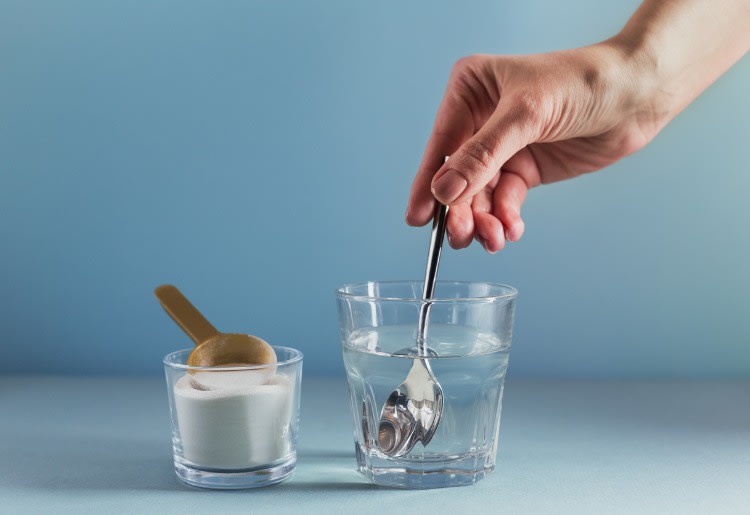- Home/
- Vitamins and Supplements/
- Collagen Powder vs. Collagen Pills: Which Is Right for You?
Collagen Powder vs. Collagen Pills: Which Is Right for You?
November 10, 2025

November 10, 2025

Collagen can be sold in powder, capsule, liquid, and topical form. However, powders and capsules are the most popular as the liquid form tends to be more pricey, and the topical version may not be as practical. Collagen in its purest form is derived from animal products. There are vegan versions of collagen supplementation, but these come in the form of collagen ‘boosters’ which help your body to produce more collagen naturally.
The three main animal-derived sources of collagen are bovine, poultry, and fish.
1. Bovine collagen is the most common and found in the hide, tendons, and bones of cattle. It is a rich source of collagen types I and III. Collagen type I is the most commonly-found form of collagen in the body. It is also the type that makes up your hair, skin, and nails.1 If you’re looking for a collagen powder to give your hair and skin some glow, bovine-derived collagen can be the right collagen powder to buy. Type III collagen is found in your bones, so bovine collagen can also help support bone health.2 If sustainability is a concern, look for a bovine collagen supplement that sources its collagen from humanely raised and/or grass-fed cattle.
2. Poultry provides another source of collagen. It’s found in chicken cartilage, bones, and eggshells. The predominant type of collagen found in poultry is type II, which is also the type found in your joints. Supplementing with type II collagen can help maintain joint flexibility and integrity. If you are very active, supplementing with poultry collagen can help aid performance and prevent injury.3 If animal welfare is important to you, choose products made from free-range chickens.
3. Marine or fish collagen is the least-common type, but is a popular option for pescatarians. Marine collagen comes from fish bones, skin, and scales. Marine collagen has similar collagen types to that of bovine collagen. If you only eat animal products in the form of seafood, this is a great substitute for bovine collagen. As for sustainability, look for collagen sourced from wild-caught fish.
In order to extract the collagen and process it into a supplement, the animal products are cleaned, and fat is removed using sodium hydroxide. Vinegar water is used to soak the product, and after evaporation, the final product of collagen powder remains, which can be consumed as a powder or in capsule form.
The biggest difference between collagen powder and collagen pills is the amount contained in each dose. Simply put, individual collagen pills can’t hold as much collagen compared to a loose powder form. That’s why many collagen pill manufacturers recommend taking at least 12 pills a day, which is simply not a very practical option for most people.
A collagen pill only holds 500mg of collagen, while one typical scoop of collagen powder contains 10g. That means you would need to take 20 pills to get the same amount of collagen in a single scoop of powder. To get all the benefits for your skin, hair, nails, bones, and joints you need to take a daily dose of at least 10-20g of collagen.1,4
Another difference between the two is that collagen powder has more flexibility to include extra beneficial ingredients like Vitamins C and E as well as hyaluronic acid. All three of these nutrients help the body to produce its own collagen and boost the absorption of your collagen supplement.5 Collagen pills simply don’t have room to include these ingredients.
Collagen powders are more versatile in their application than pills, and you can choose between flavored or unflavored types. Unflavored collagen powder is great because it can be added to your morning coffee, smoothies, protein shakes, or even food. This makes supplementation seamless considering you’re adding your supplements to things you were going to consume anyway, rather than adding something extra to your daily routine.
In terms of similarities between collagen powder and collagen pills, each provides the same benefits. Like some types of collagen powder, collagen pills are also unflavored.
In addition, both forms are portable. This is handy for those on-the-go wishing to maintain consistency with their supplementation regimen. Neither form requires refrigeration, which adds an extra layer of convenience.
The form in which you consume collagen supplements is totally up to you. Some people prefer pills if they already supplement daily with other products, as they simply need to add collagen pills to their regimen.
However, if you’re looking for a form that is most efficient for getting the effective dose, you’ll want to buy collagen powder. You may also want to buy collagen powder if you struggle to swallow pills or simply don’t like them. Collagen powder is available in different flavors, making it a great choice for your kids, while flavorless options work well when adding it to your daily protein shake, drinks, or meals.
Always check with your doctor before beginning any supplement regimen.
https://pubmed.ncbi.nlm.nih.gov/26353786/
https://pubmed.ncbi.nlm.nih.gov/29337906/
https://nutritionj.biomedcentral.com/articles/10.1186/s12937-016-0130-8
https://www.ncbi.nlm.nih.gov/pmc/articles/PMC4594048/
https://www.ncbi.nlm.nih.gov/pmc/articles/PMC6204628/
Destini is a Registered Dietician with a Bachelor’s degree in Dietetics and Nutritional Sciences. Having spent 4+ years working with professional athletes, she is now a Board Certified Specialist in Sports Dietetics and a Licensed Dietitian in the State of Florida. When she’s not writing for Top10.com, Destini runs her own successful nutrition blog and mentors budding nutrition professionals. She has also offered her expertise to articles in Food Network, Men’s Journal, and Outside Magazine.